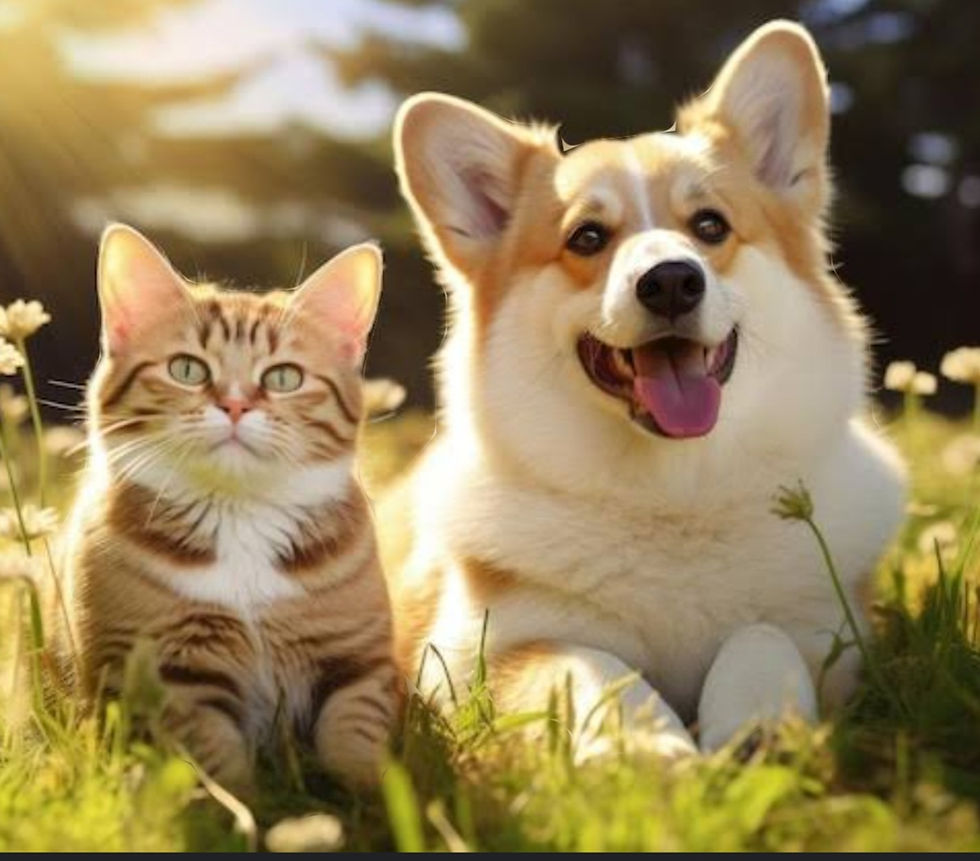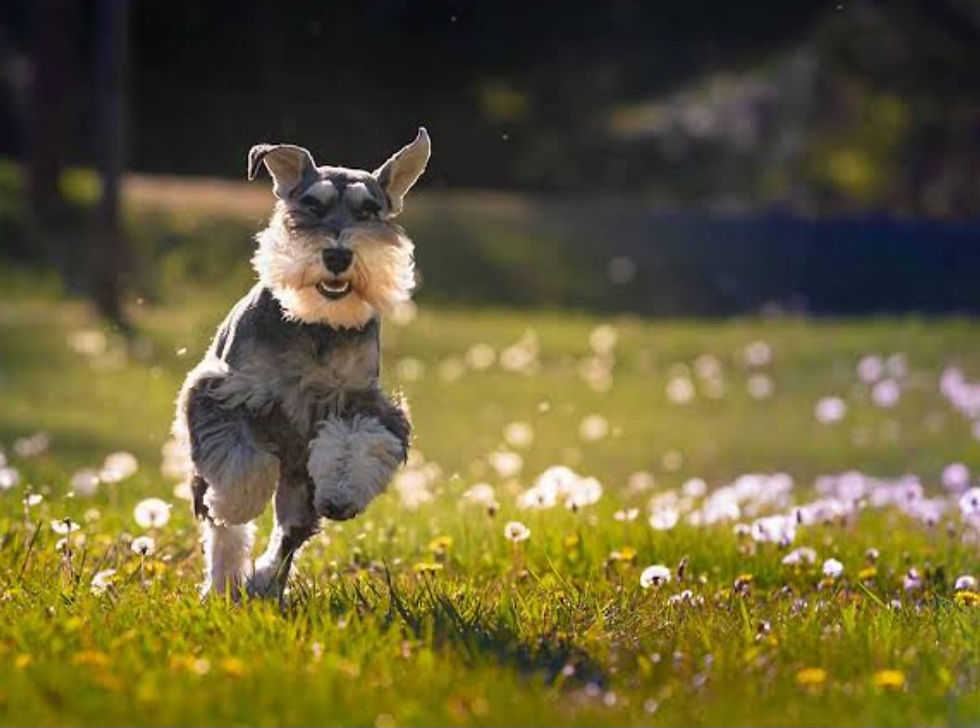Garden Hazards For Pets
- FRPNZ
- Sep 2, 2024
- 5 min read
Pets, much like children, are naturally curious and love to explore their surroundings. Dogs and cats often engage with their environment by tasting, smelling, chewing, and rolling on things they shouldn't. Unfortunately, many common plants, flowers, and fruits found in backyards and local parks contain toxins or seeds that can be very harmful to them.

When the sun comes out, so do the gardening tools and gloves. Many pet owners know that their dogs and cats enjoy following them around the garden or helping out as they work on the veggie patch. While spending the day at your local dog park or gardening in the sun with your pet can be delightful, it's important to be aware of the numerous outdoor hazards that could pose a risk to your pet's safety.
Toxic Plants
Many common weeds and plants are toxic to pets. The best prevention is to remove these from your backyard and avoid them whenever possible. However, if your pet has ingested a plant from the list below (or you suspect they have), take them to the nearest veterinary clinic as soon as possible. Always try to bring a sample of the plant for easier identification and treatment.
Toxic plants to watch out for in New Zealand include:
- Aloe Vera
- Azalea/Rhododendron
- Baby’s Breath/Gypsophila
- Barley Grass Seeds
- Bird of Paradise
- Black Nightshade
- Carnations
- Chrysanthemums
- Daffodils
- Death Cap Mushrooms
- Foxgloves
- Ipomoea/Morning Glory
- Ivy (the foliage is more toxic than the fruit)
- Karaka Tree Berries
- Lilies
- New Zealand Tree Nettle (Ongaonga)
- Onions and Garlic
- Rhubarb
- Tomato Plants
- Tulips
Before allowing your pets access to any plants, it's essential to check their safety. Ensure that the plants you bring inside your home or plant in your garden are safe for your pets. Cats, in particular, require extra consideration, as they can easily reach high shelves. If your cat has a habit of chewing on plants, it may be best to opt for imitation plants.
Karaka Berry Caution for Dog Owners
Karaka Trees, native to New Zealand, are found throughout the country. From January to April, Karaka berries ripen, turn orange, and fall from the tree. These 2.5–4 cm long berries are very appealing to dogs but are also highly toxic and can be fatal if ingested.
Symptoms of Karaka berry poisoning may include weakness, vomiting, confusion, paralysis of the back legs, convulsions, and even death. These symptoms can be delayed by a day or two, so even if your dog isn't displaying symptoms yet or if you suspect they may have eaten Karaka berries, seek veterinary treatment immediately.
Compost, Fertilisers, & Pesticides
Pets, especially dogs, love to investigate interesting smells in the garden, particularly when blood and bone fertilisers (ground animal products) or food scraps in compost bins are involved. Most fertilisers and pesticides contain chemicals that are poisonous to pets. Mouldy food in compost bins can also contain harmful toxins.
Since there are various fertilisers with different ingredients, the symptoms of ingestion may vary. These can include lethargy, vomiting, diarrhoea, excessive salivation, increased breathing and heart rate, muscle tremors, convulsions, abdominal pain, and loss of consciousness. If your pet shows any of these symptoms or you suspect they have been exposed to toxins, contact your local veterinary clinic immediately. Do not wait for symptoms to develop.
Be careful with pesticides, herbicides, insecticides, and fertilizers. If you’re going to use them in the garden, do so sparingly, and ensure your pet is in a safe place with no access to that area of the garden. The main problem arises if you don’t store these products in an out-of-the-way place and your pet chews on the container, leading to potential poisoning.

Rodent Poison
Warmer weather often leads to an increase in pests. Using poison to control rodents and insects poses a significant risk to your pets. These poisons contain chemicals that can cause neurological and other symptoms if ingested by pets. Even if you don't use rat bait in your home, your pet might encounter it while exploring your neighbour's property or around the neighbourhood. Pets can be poisoned either by directly ingesting the bait or by eating a rodent that has consumed the poison.
Depending on the type of rat poison ingested, symptoms may vary. Common signs include foul breath, pale gums, rapid or difficult breathing, vomiting with blood, nosebleeds, continued bleeding from small wounds, bruising, weakness, seizures, convulsions, and lethargy. If your pet exhibits these symptoms or you suspect they have been exposed to toxins, take them to a veterinarian immediately. If possible, bring a sample of the toxin or a package of the same type. Early identification and treatment significantly improve the prognosis.
Slug Bait
Metaldehyde, a common ingredient in slug bait, is extremely toxic to animals if ingested. Unfortunately, many pets are attracted to these baits due to their palatable ingredients. Poisoning is particularly common in cats, dogs, and chickens.
Signs of slug bait poisoning typically appear within a few minutes to three hours after ingestion and can include lethargy, vomiting, diarrhoea, increased breathing and heart rate, salivation, incoordination, muscle tremors, convulsions, and loss of consciousness. If your pet shows any of these symptoms or you suspect they have been exposed to slug bait, take them to your veterinarian immediately. Do not wait for symptoms to develop. If you have the bait packaging, bring it along to show the vet.
Bee Stings 🐝
The buzzing of a bee can attract your pet's attention, leading them to investigate or chase it. This can result in a sting, which usually causes swelling and temporary pain but is not typically dangerous. However, multiple stings, or a sting in the mouth or throat, or an allergic reaction, will require veterinary treatment. It's important to monitor your pet after a sting and contact your veterinarian if you have concerns.
Swelling is particularly dangerous if your pet is stung in the mouth or throat, as it can block their airway and make breathing difficult. Significant swelling that extends beyond the sting site can indicate an allergic reaction. Other signs of a bee sting include weakness, difficulty breathing, and extreme irritation, such as scratching at the sting site and pulling out fur. If your pet exhibits these symptoms or you are concerned about a sting, take them to your veterinarian immediately. If necessary, remove the stinger by scraping it with a fingernail or a stiff piece of cardboard. Avoid using tweezers, as this can release more venom.
Fruit Seeds and Stones
As fruit trees begin to bear their seasonal fruit, it's essential to remember that fallen fruits may be easily accessible to your pets. The seeds, stones, and pits of many fruits can harm your cat or dog. For example, the seeds or pits of peaches, plums, apricots, and cherries contain cyanide, which is highly toxic to both humans and dogs. Dogs are more likely to break down the stone or pit with their powerful jaws, releasing the toxin into their system. Additionally, stone fruit can cause intestinal obstructions in dogs, and fruits with hard stones can cause painful tooth fractures if bitten into.
Fruits to keep away from your cats and dogs include:
- Apples (only the core and seeds are toxic; apple slices can be a nice snack)
- Avocados
- Grapes
- Nectarines (flesh is not toxic)
- Apricots (flesh is not toxic)
- Cherries
- Peaches (flesh is not toxic)
Gardening Tools
Leaving your tools out, even briefly, can pose a risk to your pet's safety. Gardening tools are often sharp and pronged, making it easy for a pet to injure themselves. Even if tools are packed away, ensure they are stored in a safe, locked place, secure from your curious pet.
While prevention is always the best approach, pets can sometimes get into things they shouldn't. If this happens, call your local veterinary clinic immediately for advice on how serious the issue is and the next steps to keep your pet safe and healthy.
We highly recommend PD Insurance, for a quote please click the link below



Hozzászólások